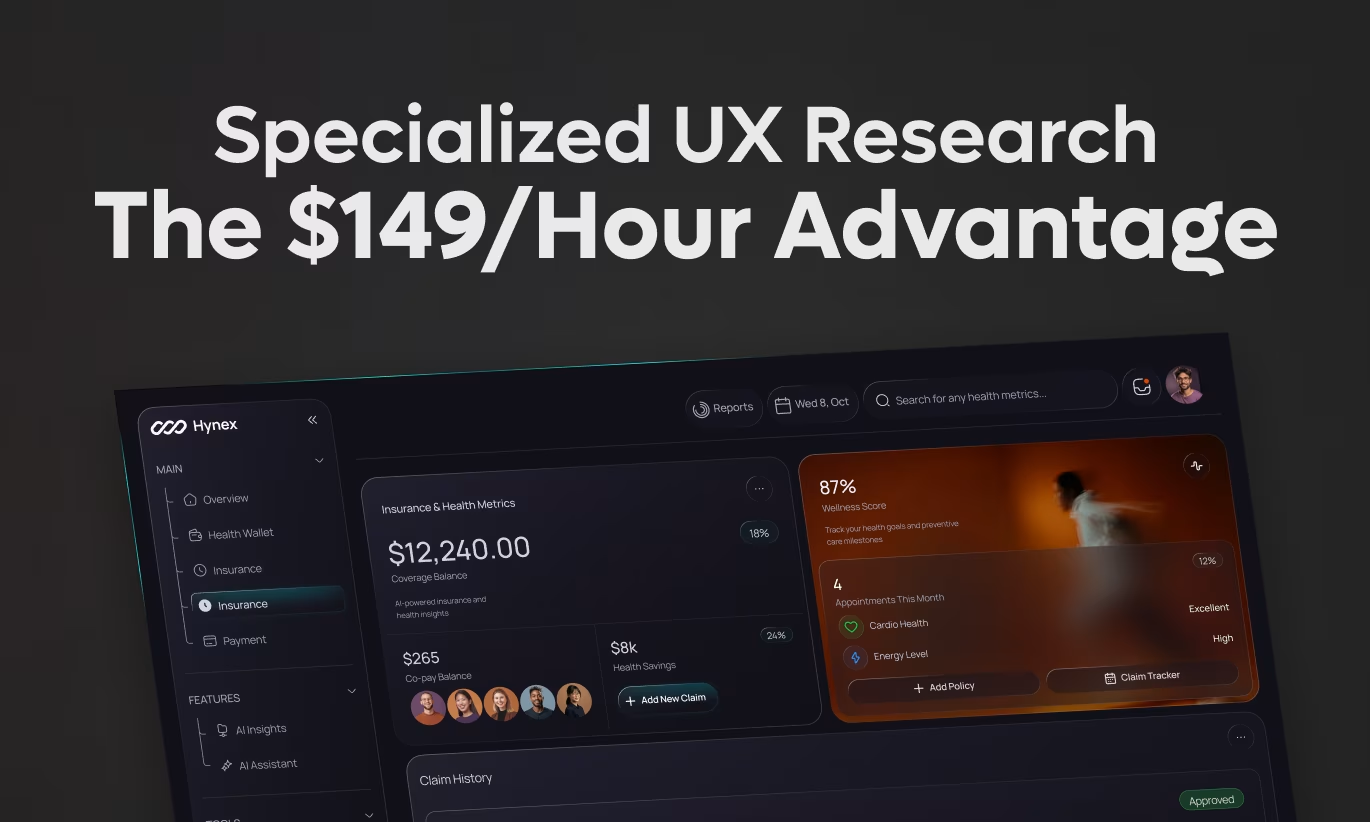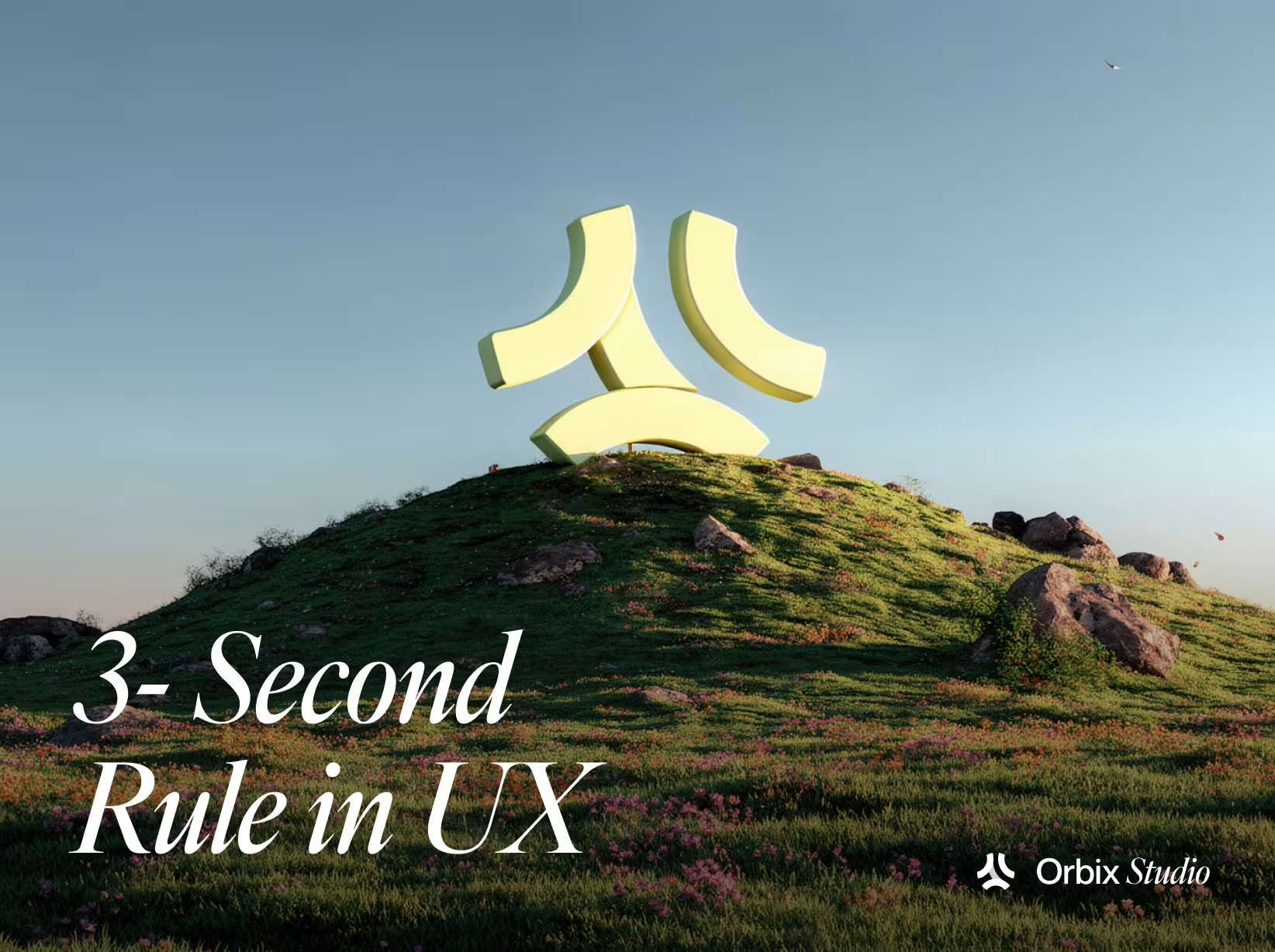Table of Contents
- The Hidden Complexity of Enterprise User Research
- What You're Actually Paying For in Specialized Research
- The Real Cost of Cheap Research
- When Specialized Research Delivers Exponential ROI
- Evaluating Specialized Research Investment
- The Pricing Reality of Quality Enterprise Research
- Building Your Research Investment Strategy
- Making the Investment Decision

When enterprise companies invest in user research, they're not just buying hours—they're purchasing expertise that can make or break million-dollar digital transformations. Yet many decision-makers struggle to understand why specialized user research pricing for B2B contexts ranges from $149 to $300+ per hour, while freelance researchers charge $50-75.
The difference isn't arbitrary. It's the gap between surface-level insights and strategic intelligence that drives measurable business outcomes.
The Hidden Complexity of Enterprise User Research
Enterprise UX research operates in a fundamentally different universe than consumer product research. When a B2B SaaS company needs to understand why their enterprise sales platform has a 40% adoption rate among sales teams, they're not looking for simple usability fixes.
They're navigating organizational politics, legacy system integrations, multi-stakeholder approval processes, and compliance requirements that would make consumer researchers' heads spin. The research must account for the CIO's security concerns, the CFO's ROI expectations, the end-users' workflow disruptions, and the executive team's strategic vision—all simultaneously.
This is where specialized user research becomes non-negotiable. A researcher charging $149/hour brings methodological sophistication that generic UX practitioners simply don't possess. They understand how to design studies that satisfy both qualitative insight needs and quantitative validation requirements. They know how to navigate NDA-heavy environments where participants can't freely discuss their work. They're fluent in the language of stakeholders who measure success in reduced training costs, improved sales velocity, and decreased support tickets.

What You're Actually Paying For in Specialized Research
When you see user research pricing B2B at premium rates, you're paying for layers of expertise that compound exponentially in value.
Domain-Specific Knowledge Architecture
A specialized enterprise researcher doesn't start from zero with your industry. If they focus on fintech, they already understand regulatory constraints, audit trail requirements, and the psychology of users making high-stakes financial decisions. This eliminates weeks of ramp-up time and prevents naive research designs that waste everyone's time.
One healthcare technology company learned this the hard way. They hired a consumer-focused research team at $75/hour to study physician workflows. Three months and $45,000 later, they had beautiful reports that completely missed HIPAA compliance implications and clinical decision-making patterns. A specialized healthcare UX researcher would have surfaced these critical factors in week one.
Advanced Methodological Versatility
Enterprise contexts demand research approaches that go far beyond basic usability testing. Specialized researchers deploy ethnographic studies in complex organizational environments, design diary studies that capture decision-making over weeks or months, and conduct sophisticated quantitative analysis that withstands CFO scrutiny.
They know when to use conjoint analysis to understand feature prioritization among enterprise buyers. They can design research that satisfies legal review while still generating actionable insights. They understand how to structure studies that account for the "buyer-user gap"—the reality that the person purchasing your enterprise software often isn't the person using it daily.
Stakeholder Navigation and Translation
Perhaps the most undervalued skill in specialized user research: the ability to translate insights across wildly different stakeholder languages. Your engineering team needs specific interaction patterns and edge cases. Your sales team needs competitive positioning insights. Your C-suite needs strategic recommendations tied to business metrics.
A researcher charging premium rates can walk into a room with your VP of Sales, Head of Product, and CTO, and communicate findings in ways that each stakeholder can immediately operationalize. This translation ability often delivers more value than the research itself, because insights that aren't understood aren't implemented.
The Real Cost of Cheap Research
Here's what companies don't calculate when they opt for budget user research: the opportunity cost of mediocre insights.
When a mid-market B2B software company invested $30,000 in budget research for their platform redesign, they got technically correct but strategically useless findings. The research confirmed users wanted "easier navigation" and "better search"—insights so generic they could apply to any software ever built.
Meanwhile, their competitor spent $89,000 on specialized research that uncovered a critical insight: their target users weren't struggling with navigation—they were struggling with justifying the software purchase to their managers. The competitor redesigned their platform to generate automatic ROI reports and usage analytics that made internal advocacy effortless. They captured 23% market share in 18 months.
The $59,000 difference in research investment created a multi-million dollar outcome gap.
Budget research also carries hidden costs in cycle time. When findings are superficial or miss critical context, you discover the problems after launch—when fixing them costs 10-100x more than getting them right initially. You waste months building features that don't move adoption metrics. You burn through engineering resources on solutions to the wrong problems.
When Specialized Research Delivers Exponential ROI
Specialized user research pricing B2B makes sense in specific scenarios where the stakes and complexity align with the expertise premium.
Complex Stakeholder Ecosystems
If your product serves multiple user types with conflicting needs—think healthcare platforms used by patients, providers, administrators, and insurers—specialized research becomes essential. Generic researchers will interview each group separately and report their needs. Specialized researchers will map the ecosystem dynamics and show you where meeting one group's needs creates problems for others, then design solutions that optimize the entire system.
High-Stakes Decision Making
When your product decisions involve significant capital investment, regulatory risk, or market positioning consequences, cheap research is expensive insurance. A pharmaceutical company about to invest $12 million in a clinical trial management platform should not be making decisions based on $25,000 in basic usability studies. The research investment should match the decision magnitude.
Organizational Change Initiatives
Enterprise software adoption isn't a UX problem—it's a change management problem wrapped in a UX challenge. Specialized researchers understand this. They design studies that uncover not just what users struggle with, but why organizational culture, incentive structures, and political dynamics create resistance to new tools. This intelligence is worth exponentially more than interface recommendations.
Evaluating Specialized Research Investment
Smart buyers of user research don't just compare hourly rates—they evaluate the likely return on research investment.
Ask potential research partners how they've helped similar companies connect research findings to business outcomes. A specialized researcher should immediately reference specific metrics: reduced onboarding time, increased feature adoption, improved sales conversion, decreased support costs. If they only talk about deliverables and methodologies, they're not operating at the strategic level you need.
Examine their understanding of your industry before you explain it. In the first conversation, a specialized researcher should demonstrate familiarity with your competitive landscape, typical user challenges, and industry-specific constraints. If you're educating them about basic domain realities, you're not getting specialized expertise.
Evaluate their stakeholder engagement approach. Premium researchers don't just present findings—they facilitate collaborative synthesis sessions where stakeholders collectively interpret insights and generate solutions. This collaborative approach dramatically increases the odds that research actually influences decisions rather than gathering dust in a slide deck.
The Pricing Reality of Quality Enterprise Research
User research pricing B2B typically breaks down into three tiers, each serving different needs and complexity levels.
Basic Research ($50-90/hour): Suitable for straightforward usability testing of well-understood interfaces. Good for incremental improvements when you already know your users well. Typically delivered by freelancers or junior researchers.
Professional Research ($100-175/hour): Appropriate for most enterprise research needs. Delivered by experienced researchers with some domain expertise. Can handle moderately complex studies and stakeholder environments. This tier covers most B2B software research projects.
Specialized/Strategic Research ($175-300+/hour): Necessary for high-complexity environments, novel product categories, or mission-critical decisions. Delivered by researchers with deep domain expertise and proven track records of influencing major strategic decisions. Often includes strategic advisory beyond pure research execution.
The mistake companies make isn't choosing the wrong tier—it's mismatching the tier to the problem complexity. Using basic research for strategic decisions is like using a calculator for structural engineering. The tool works fine, but it's not built for the job you're trying to do.
Building Your Research Investment Strategy
Smart enterprise companies don't have a single research budget line—they have a portfolio approach that matches investment to decision importance.
For routine optimization and incremental improvements, lighter-weight research methods and more affordable rates make perfect sense. You're validating hypotheses in domains you already understand well. A week of basic usability testing at $75/hour can prevent expensive implementation mistakes.
For strategic initiatives, new market entries, or platform redesigns, the specialized research premium pays for itself many times over. When a single design direction decision will influence two years of engineering work and millions in development costs, spending $80,000 on comprehensive specialized research instead of $25,000 on basic studies is obvious risk management.
The key is being honest about which category your current need falls into. Most companies underestimate their problem complexity, which is why they end up disappointed with generic research findings that don't move the needle.
The Future of Enterprise UX Research
As B2B software becomes more sophisticated and enterprise buying processes grow more complex, the specialized research premium will likely increase rather than decrease. The gap between generic UX research and true enterprise research expertise is widening.
Companies that understand this shift are building long-term relationships with specialized research partners who develop deep knowledge of their products, users, and strategic challenges over time. This continuity creates compound returns—each research engagement builds on previous insights, and researchers become increasingly effective as their domain knowledge deepens.
The researchers commanding premium rates aren't just better at conducting studies—they're better at translating user insights into business strategy, navigating organizational complexity, and designing research that answers the questions executives are actually asking, even when those questions aren't explicitly articulated.
Making the Investment Decision
When you're evaluating user research pricing B2B, don't start with the hourly rate. Start with the potential value of getting your strategic decisions right versus wrong.
If improving your enterprise platform's adoption rate from 60% to 85% among paying customers would generate $2 million in retained revenue annually, how much is research worth that increases your odds of achieving that outcome? Probably more than $149/hour.
If launching your new product in the wrong market segment would waste $5 million in go-to-market investment, how much is research worth that validates your targeting before you commit resources? Certainly more than a budget research engagement.
The $149/hour difference isn't about the hours—it's about the outcomes those hours make possible. Specialized enterprise user research is expensive. Getting enterprise UX wrong is exponentially more expensive.
Choose accordingly.
Free Churn Reduction Assessment
Get a complimentary analysis identifying your churn triggers:
✓ Current onboarding effectiveness evaluation
✓ Engagement pattern analysis revealing friction points
✓ Churn cohort analysis identifying when/why users leave
✓ Prioritized recommendations by retention impact
✓ Expected churn reduction from implementing strategies
✓ 90-day implementation roadmap
Limited to 5 SaaS companies monthly | Value: $4,500

















